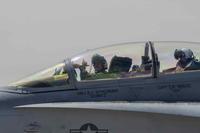After Tuesday's deadly terrorism attack in Brussels, Defense Secretary Ashton Carter said the U.S. military plans to spend more to combat the Islamic State in Iraq and Syria, or ISIS.
The bombings at the airport and on the subway system in the capital of Belgium -- home to the European Union and NATO -- reportedly killed at least 34 people and injured about 130 more, according to multiple news reports. U.S. European Command and NATO went on high alert in response.
Belgian Prime Minister Charles Michel described the bombings as "terrorist attacks," which came just days after the arrest in the city of terror suspect Salah Abdeslam, a Belgian-born French national, who was wanted in connection with last year's deadly Paris attacks, for which ISIS claimed responsibility.
The Defense Department has budgeted $7.5 billion for Operation Inherent Resolve, the name of the military operation against militants affiliated with ISIS, also known as ISIL, in fiscal 2017 beginning Oct. 1.
That's about 50 percent more than the funding level for the current fiscal year and is vital to the plan to "destroy the ISIL parent tumor in Iraq and Syria by attacking its two power centers in Mosul, Iraq, and Raqqa, Syria" and to "combat the emerging metastases of the ISIL tumor worldwide wherever they appear," including in Afghanistan, Libya and North and West Africa, according to written testimony Carter provided Tuesday morning to lawmakers on the House Armed Services Committee.
The trend of steadily decreasing defense spending in Europe may finally be coming to an end, as countries there look to boost anti-terrorism efforts. NATO members in Europe collectively spent an estimated $253 billion on defense in 2015, a decrease of $35 billion, or 12 percent, since 2008, according to a January report from NATO on defense expenditures.
But that trend is slowing due in part to added funding for more police and intelligence officers and defense equipment in Germany, France and Belgium.
"After many years of substantial reductions in defense spending, the cuts have now practically stopped among European Allies and Canada," NATO Secretary General Jens Stoltenberg said in January after the release of the report, according to a release. "And in 2015, defense cuts were close to zero."
He added that defense investments must be further increased in light of other security challenges such as terrorism threats.
Carter also said the U.S. plans to quadruple funding for the so-called European Reassurance Initiative to $3.4 billion to deter Russian military aggression in the Ukraine and eastern Europe.









